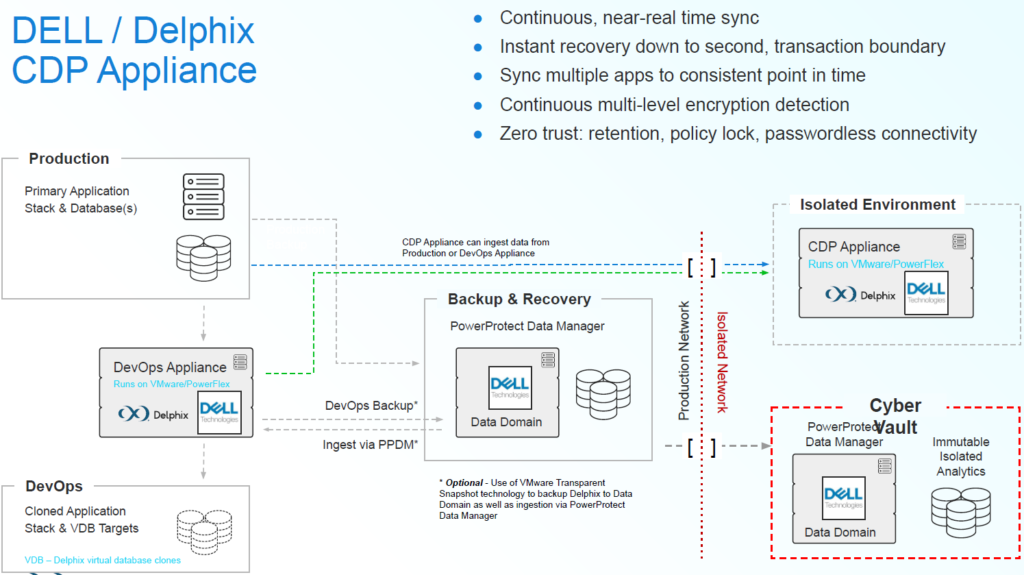By Simon Stevens, PowerFlex Engineering Technologist, EMEA. January 2023.
Towards the start of autumn last year, Dell Technologies announced the “Dell Validated Platform for Red Hat Openshift”, a solution that has been jointly validated by both Dell and Red Hat to provide faster time to value for customers (and potential customers) when deploying Red Hat Openshift Cloud Platform onto the modern, flexible, software-defined PowerFlex infrastructure. That announcement certainly generated a lot of interest in the industry – see this article here by Storage Review.Com for their take on this announcement, along with our own announcement on the Dell Infohub Site in this article.
Red Hat is not the only technology collaborator that can see the value of Dell PowerFlex. There is an almost infinite list of software products, application platforms and workloads that are ideally suited to being deployed on software defined infrastructure solutions such as PowerFlex. Any application that demands consistent and optimal performance 24x7x365, that requires enterprise-grade reliability and availability in the face of ever-changing demands, can scale storage and/or compute independently, or is able to take advantage of an API-driven architecture, will likely be a perfect fit for PowerFlex. Hence, it is unsurprising to see other technology companies following in the footsteps of Red Hat and choosing to collaborate with Dell to create “appliance offerings” that utilise Dell PowerFlex appliances. Customers quite rightly will be interested to hear about any technologies that simplifies their infrastructure or makes things easier to manage and operate.
As organisations shift to DevOps and the pace of development increases, the traditional approach for copying data in and between test environments is increasingly at odds with the demands for efficiency, privacy and security. Application release cycles have moved away from the traditional waterfall methodology and gone over to CI/CD delivery processes in what seems to have been a blink of the eye. Each time a new application version is released, developers need to know that the new version will work, which means that any new release candidate must be tested in the right environment, using the right data. This is where the discipline of Test Data Management comes in – using API-driven automation, developers can deliver the right quality of data into test environments for fast CI-CD pipeline testing.
However, moving data around increases the risks of something happening to that data – security still needs to be applied across all environments that any application data might reside on during its lifecycle prior to becoming the latest PROD release – dev/test, UAT, staging, integration testing, the list can be a long one. Indeed, the data itself is likely to move across the multi-cloud during its development lifecycle. This increased data mobility forces organisations to adopt Zero Trust policies in order to fully protect this valuable data.
Dell Technologies OEM Engineered Solutions (OES) Team have just announced two technology collaborations between Dell PowerFlex and Delphix, one in the TDM (Test Data Management) space and the other in the CDP (Continuous Data Protection) space. The Dell OES program enables validated configurations with an easy, flexible purchase experience for Dell Technology customers. Both of these offerings utilise Dell PowerFlex appliances as the infrastructure for these “Solution Appliances” to be built upon. Let us look at both of these in more detail, starting with the Dell Delphix DevOps Appliance.

The Dell Delphix DevOps Appliance combines the Dell PowerFlex appliance infrastructure with Delphix’s Continuous Data and Continuous Compliance offerings in one co-engineered offering, to provide customers with a best-of-breed solution for todays DevOps requirements. Delphix software provides the integrations with Jenkins, Terraform and other automation services that traditional TDM products simply do not have. Delphix is unique in providing API test driven test data as well as automated data, profiling, discovery and masking capabilities. Quick provisioning of test data helps ensure that the pace of development isn’t slowed. However the DevOps Test Data Management appliance delivers test data using API’s at speed with data security. Dell PowerFlex provides the scalable, API-driven infrastructure for the software to reside on. Plus integration with Dell Data Domain ensures that customers can easily implement this solution into their existing enterprise backup infrastructure.
The second offering is the Dell Delphix CDP appliance.

This solution combines Dell PowerFlex appliances with Delphix Continuous Vault to provide a Continuous Data Protection Appliance that can be rolled back to any point in time, down to the second or transaction boundary, with near zero RPOs. This Appliance can instantly recover entire databases and/or database files very quickly by integrating directly via API’s with automation tools like Jenkins and other CI-CD build tools. Being able to have a consistent point in time across multiple applications makes business sense, as multiple apps are often needed to work end to end and in parallel. Once deployed, multi-level encryption detection can be automated to check if encryption keys have been tampered with, as well as data discovery and masking.
Best of all, this solution again is built on top of PowerFlex to give the best possible performance, scaling and reliability, plus backups can again go to Dell Data Domain. Dell have created several “PowerFlex Delphix Appliance” T-Shirt sizes to provide customers with 4 different sizing options, giving easy and flexible configuration options to choose from.
When we announced the Dell Validated Platform for Red Hat OpenShift, the aims of both Dell & RedHat were simple – to provide a co-engineered solution that provides customers with a modern, flexible IT infrastructure on which they can deploy enterprise-grade Kubernetes environments for building, deploying and managing containerized applications. So, having deployed their development environments on PowerFlex, these customers can now also use Dell Delphix PowerFlex appliances in order to easily manage, secure and protect their application test data.
More details on Dell Delphix PowerFlex appliances can be found by reaching out to the Dell OEM Engineered Solutions Team via the following link here.


